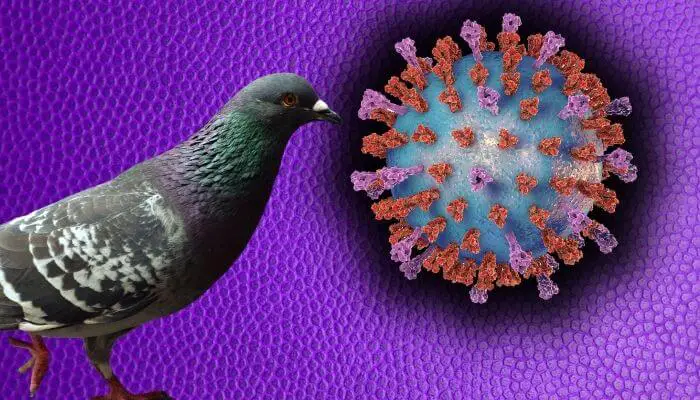Paramyxovirus is a deadly disease that can quickly kill an entire flock of pigeons.
Keeping your pigeons healthy and safe is part and parcel of owning birds whether you breed them, show them or merely keep them as pets.
It’s vital to make sure you know what signs indicate a possible infection and what to do about it.
One disease you really should know about is paramyxovirus.

The first thing you should know is that DEFRA (the Department of Agriculture, Environmental and Rural Affairs) now refers to paramyxovirus as Avian Avulavirus.
You might also sometimes hear it called Newcastle disease, but this is more applicable to poultry than pigeons.
What is Paramyxovirus?
It is a viral disease. The virus is tagged as PPMV1.
The disease spreads very quickly and can make pigeons very sick and often leads to death. Because it’s so contagious, it’s important to be able to identify symptoms and isolate birds that are sick.
The disease can kill a pigeon in as little as three days so prompt attention is required if you suspect paramyxovirus in your flock.
It’s also important to know that, while rare, the virus is zoonotic which means it can spread to humans, so you need to be especially cautious when handling pigeons that have paramyxovirus.
Paramyxovirus is currently a notifiable disease in most countries. If any of your birds are diagnosed with the virus, you must report it to the relevant authority (The Animal and Plant Health Agency in the UK).

Symptoms of Paramyxovirus
Anytime you have a sick pigeon, it pays to call the vet and have them examined. If your vet doesn’t deal with pigeons, try your local/nearest pigeon-friendly rescue center.
This way you can get a diagnosis and apply appropriate treatment methods for caring for your bird.
Symptoms of paramyxovirus include
- Vomiting
- green diarrhoea
- Twisting of the neck
- laboured breathing
- head flicking
- runny eyes
- runny beak
- lethargy
- circling
Transmission of Paramyxovirus
This viral disease is very transmissible and once established, spreads very rapidly.
The virus is shed in pigeon feces and other discharges and contaminates the immediate environment; water bowls, bird feeders, bedding, equipment and also human clothing.
This means it can easily spread throughout a loft.
It can also be spread to other lofts by infected pigeon transporters and pigeon fanciers who have the infection on their hands, feet or clothes.
Paramyxovirus can also be spread from wild pigeons to domesticated pigeons if they have contact.
Pigeons can be born with paramyxovirus as the virus can pass from the parent bird to the egg.
The virus can survive in the environment for several weeks, especially in cool weather.
Treatment of Paramyxovirus
At the time of writing, there is no treatment to cure paramyxovirus.
Although there is a high mortality rate with the majority of infected birds dying within 72 hours, some may survive with supportive therapy.
Therapeutic methods include the administering of electrolytes, probiotics and acidifying agents usually to drinking water.
You can offer your pigeon supportive care to help increase the chances of survival.
This includes moving the bird to its own cage and keeping it warm and comfortable. You may need to feed and water your pigeon by hand, however, you should never force it as the stress from this can exacerbate symptoms.
Your goal is to keep your bird comfortable and treat symptoms.
Keep in mind that even if your pigeon recovers, there may be long-term complications from paramyxovirus that you need to be aware of so that you can treat them.
How to Prevent Paramyxovirus
Vaccination:
There is a vaccine available for paramyxovirus. Talk to your vet.
Simple cleanliness and hygiene can help prevent paramyxovirus:
- Prevent contact between your pigeons and wild pigeons
- Prevent water and food from being contaminated by wild pigeon faeces
- Isolate/quarantine for two weeks any new pigeons you introduce, or pigeons returning from races and shows.
- Limit the number of visitors to your loft
- Keep loft and all equipment clean including any equipment you use to transport pigeons
- Wash your hands and clothes after handling your birds
- Practice good biosecurity when attending other lofts, shows and races.
Contact Practices:
If you race pigeons, only enter your birds in races where it is a requirement that all pigeon contestants have been vaccinated against paramyxovirus.
The same for shows – check the entrance requirements to see if unvaccinated birds are allowed to participate. If they are, you will need to consider the risk to your birds.
If you suspect that any participating pigeon in a show or race, you should inform the Animal and Plant Health Agency.

This article was written by our qualified veterinarian Cristina.
This is part of our commitment to providing you with the most trustworthy veterinary advice for your pigeons.
The Takeaways
- Recognise the symptoms of paramyxovirus
- Report any incidence of the disease as per local requirements
- Vaccinate your pigeons against paramyxovirus
- Practice good hygiene and biosecurity.
Sources:
